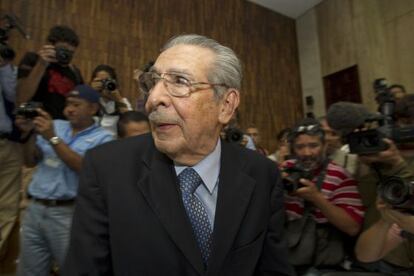Court sets aside convictions against former Guatemala dictator Ríos Montt
Retired general will be retried for genocide and crimes against humanity

Guatemala’s Constitutional Court on Monday revoked the 80-year prison sentence handed down earlier this month against former dictator Efraín Ríos Montt, and ordered him to be retried on charges of genocide and crimes against humanity.
In a three-to-two vote, the court sided with arguments by Ríos Montt’s defense team, which said that his two-month trial had been replete with errors. Specifically, the court ruled that a lower judges’ panel did not resolve a petition for the recusal of two magistrates on the bench, and ordered that all the proceedings and testimonies taken from April 19 to May 10 must be repeated.
The Constitutional Court had come under pressure from powerful conservative groups, including the Veterans Association (Avemilgua) which threatened to call out some 50,000 paramilitaries from the dreaded Civil Self-Defense Patrols (PAC) as well as its own members.
Avemilgua threated to hold a massive march in Guatemala City, and block major streets until retired General Ríos Montt was released from prison. Since his conviction, conservative and business groups have taken out radio and television spots emphatically denying that there was any genocide in Guatemala.
The negative reaction by the military had been expected. Before democracy was restored in 1985, the army had demonstrated blind allegiance to its commanders and traditionally involved itself in party politics without having to answer to any civilian structure. Guatemalan democracy suffered from a string of coups throughout the years.
Impunity continues to be the only law that governs in Guatemala”
Historian José Cal explains that big business has always supported the military because “the army has traditionally served capital” and was financed by the country’s industrial sector.
But analyst Manfredo Marroquín, president of the independent group Citizens Action, told EL PAÍS that the retrial order demonstrates “the extreme weakness of the Guatemalan justice system.”
“Impunity continues to be the only law that governs in Guatemala,” he said.
The former general, who ruled for less than 18 months between 1982 and 1983, was convicted earlier this month for his role in allowing the army to carry out a string of massacres and other atrocities in Mayan communities during the civil war.
Gonzalo Asturias, who was Rios Montt’s press secretary, said that the retired general was “a scapegoat who tried to stop the bloodbath he inherited from the government of Romero Lucas García” after he had overthrown him to take the presidency.
Tu suscripción se está usando en otro dispositivo
¿Quieres añadir otro usuario a tu suscripción?
Si continúas leyendo en este dispositivo, no se podrá leer en el otro.
FlechaTu suscripción se está usando en otro dispositivo y solo puedes acceder a EL PAÍS desde un dispositivo a la vez.
Si quieres compartir tu cuenta, cambia tu suscripción a la modalidad Premium, así podrás añadir otro usuario. Cada uno accederá con su propia cuenta de email, lo que os permitirá personalizar vuestra experiencia en EL PAÍS.
¿Tienes una suscripción de empresa? Accede aquí para contratar más cuentas.
En el caso de no saber quién está usando tu cuenta, te recomendamos cambiar tu contraseña aquí.
Si decides continuar compartiendo tu cuenta, este mensaje se mostrará en tu dispositivo y en el de la otra persona que está usando tu cuenta de forma indefinida, afectando a tu experiencia de lectura. Puedes consultar aquí los términos y condiciones de la suscripción digital.








































